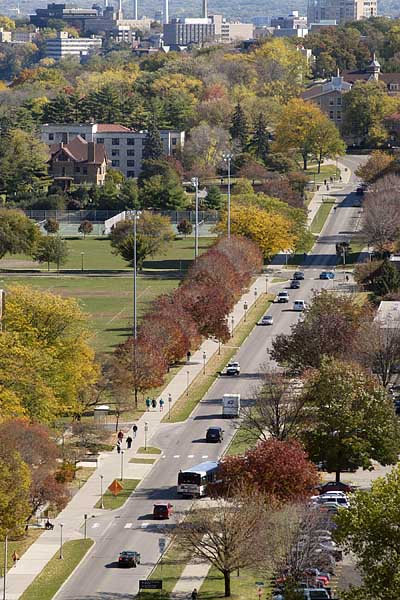A decline in federal aid for transportation continues Wisconsin’s difficulty in funding road projects and may lead to an increase in gas taxes and transportation usage fees.
Federal aid for transportation in Wisconsin has declined by 10 percent over the last five years. The decline may cause a shortage in funds available for transportation infrastructure development, such as building highways and roads. According to the Associated Press, federal aid for Wisconsin highways has dropped from a high of $833 million to $750.6 million in 2013, which is an approximate 3.6 percent decline.
Jon Peacock, director of the Wisconsin Budget Project, said Wisconsin is anticipating nearly $19 billion in federal revenue over the next two years, which is about 30 percent of the total state budget. Of this, 10 percent is dedicated to transportation costs. If federal aid to Wisconsin decreases, the amount allotted for transportation costs will become even smaller, Peacock said.
Peacock said the decline might be a result of the national fuel tax, which has not been raised in the last 20 years. The fuel tax is one of the main contributors to federal revenue and its stagnant position could be responsible for low federal revenue and thus, a low amount of aid given to the state of Wisconsin. Raising the fuel tax is an option currently being debated, he said.
“I think that there’s certainly discussion amongst legislators about the need to increase the gas tax or other transportation usage fees, but there are so many legislators who have pledged not to raise taxes that it’s unclear what they’re going to decide to do,” Peacock said.
Rep. John Spiro, R-Marshfield, said there are certain roads in Wisconsin that need more development to improve their productivity, some of which are being assisted by federal aid.
Spiro said the reduction in aid for transportation costs has not had a significant impact on transport infrastructure development. He said no projects have been halted since it would be more expensive to restart them later.
“You’re going to pay the lowest price for it [the transport infrastructure project] now than you’re ever going to pay for it, and pushing it back by so many years is going to cost you that much more,” Spiro said. “So I think it would be better to take care of it now.”
In order to support increasing transportation costs, Gov. Scott Walker has considered borrowing, Peacock said. This is concerning because of the effects it might have on Wisconsin’s finances, he said.
Spiro said he is against borrowing because it adds on to the increasing costs of providing aid to transportation.
Spiro said he plans on implementing a survey that will ask the public its opinion on how to deal with the growing transportation costs. He suggested fuel indexing as another solution for making transportation infrastructure development more affordable.
“What happens if they decide they’re not going to fund that and they continue to take the dollars down?” Spiro asked. “We’re going to have to figure out better ways to make sure that there is infrastructure that’s positive and make sure that we’re doing what our communities need.”
Peacock said the state budget needs to scale down on unnecessary projects. This will help increase the total funds available to transportation infrastructure development and to other sectors such as education without having to implement an increase in taxes, he said.


